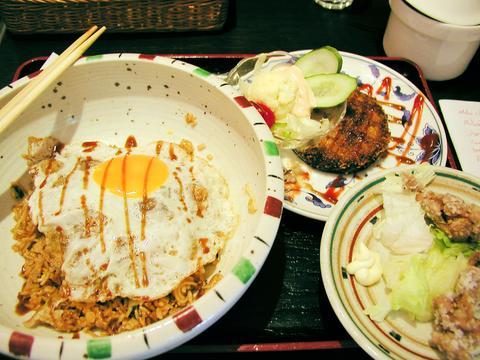Yi Fan Ting is a hip little ramen joint with three branches around town -- on Yongkang Street, Guangfu Road and Qingdao Road -- and at each you should consider yourself lucky if the wait for a table is under 20 minutes. Popularity, of course, isn't necessarily a sign of good food, but in this case, it certainly is.
The menu offers a large range of foods, but the specialization in ramen is clear, in particular the chef's signature spicy ramen. When diners sit down, they're handed a plastic fan and at first I thought this was a cheap excuse for not turning the air-conditioning up a couple of notches. It turns out that the fan comes in handy if you have the gusto take on the spicy ramen, which has cautionary flames next to it on the menu and is served with a deep ochre-tinted layer of searing spicy oil. Those who bravely (or foolishly, it's hard to tell) take on the spicy ramen challenge are identifiable by their frantic fan flapping and sweaty, beet-red faces.

PHOTO: MAX WOODWORTH, TAIPEI TIMES
But I've seen Tampopo enough times to know that superior ramen is achieved through subtlety, which could hardly describe Yi Pan Ting's spicy noodle specialty. So, if heart-stopping spice is not the experience you want for lunch or you forgot to bring a change of shirts, there are tamer offerings. The fatty pork ramen is a good place to start, with its rich broth, delicate slices of pork and a fistful of mushrooms and bamboo shoots, or the zesty
miso-based ramen. This being the dog days of summer, there are two cold noodle dishes, one with hearty soba noodles under heaps of fresh garden vegetables and another that takes its cue from Taiwan's own ground pork dan-zi noodles.
One of the more interesting dishes on offer is the Osaka fried noodles, which is actually mixed with fried rice and topped with a fried egg, making it a hefty and flavorful main course that would be perfect if it weren't a tad overly salty.
Most of the ramens and the fried noodle dishes can be part of a set meal which run between NT$210 and NT$260 and come with either a salad or chunks of fried chicken, self-serve ice cream and either coffee or tea. The set meal should satisfy most appetites, but larger hungers may seek out the fried dumplings, which are also too salty for their own good, or the Mr. Cola fried rice and beef patty. Whatever you choose, it's worth the wait, and makes the J-Pop pretty enjoyable too.

Taiwan has next to no political engagement in Myanmar, either with the ruling military junta nor the dozens of armed groups who’ve in the last five years taken over around two-thirds of the nation’s territory in a sprawling, patchwork civil war. But early last month, the leader of one relatively minor Burmese revolutionary faction, General Nerdah Bomya, who is also an alleged war criminal, made a low key visit to Taipei, where he met with a member of President William Lai’s (賴清德) staff, a retired Taiwanese military official and several academics. “I feel like Taiwan is a good example of

March 2 to March 8 Gunfire rang out along the shore of the frontline island of Lieyu (烈嶼) on a foggy afternoon on March 7, 1987. By the time it was over, about 20 unarmed Vietnamese refugees — men, women, elderly and children — were dead. They were hastily buried, followed by decades of silence. Months later, opposition politicians and journalists tried to uncover what had happened, but conflicting accounts only deepened the confusion. One version suggested that government troops had mistakenly killed their own operatives attempting to return home from Vietnam. The military maintained that the

Before the last section of the round-the-island railway was electrified, one old blue train still chugged back and forth between Pingtung County’s Fangliao (枋寮) and Taitung (台東) stations once a day. It was so slow, was so hot (it had no air conditioning) and covered such a short distance, that the low fare still failed to attract many riders. This relic of the past was finally retired when the South Link Line was fully electrified on Dec. 23, 2020. A wave of nostalgia surrounded the termination of the Ordinary Train service, as these train carriages had been in use for decades

Lori Sepich smoked for years and sometimes skipped taking her blood pressure medicine. But she never thought she’d have a heart attack. The possibility “just wasn’t registering with me,” said the 64-year-old from Memphis, Tennessee, who suffered two of them 13 years apart. She’s far from alone. More than 60 million women in the US live with cardiovascular disease, which includes heart disease as well as stroke, heart failure and atrial fibrillation. And despite the myth that heart attacks mostly strike men, women are vulnerable too. Overall in the US, 1 in 5 women dies of cardiovascular disease each year, 37,000 of them